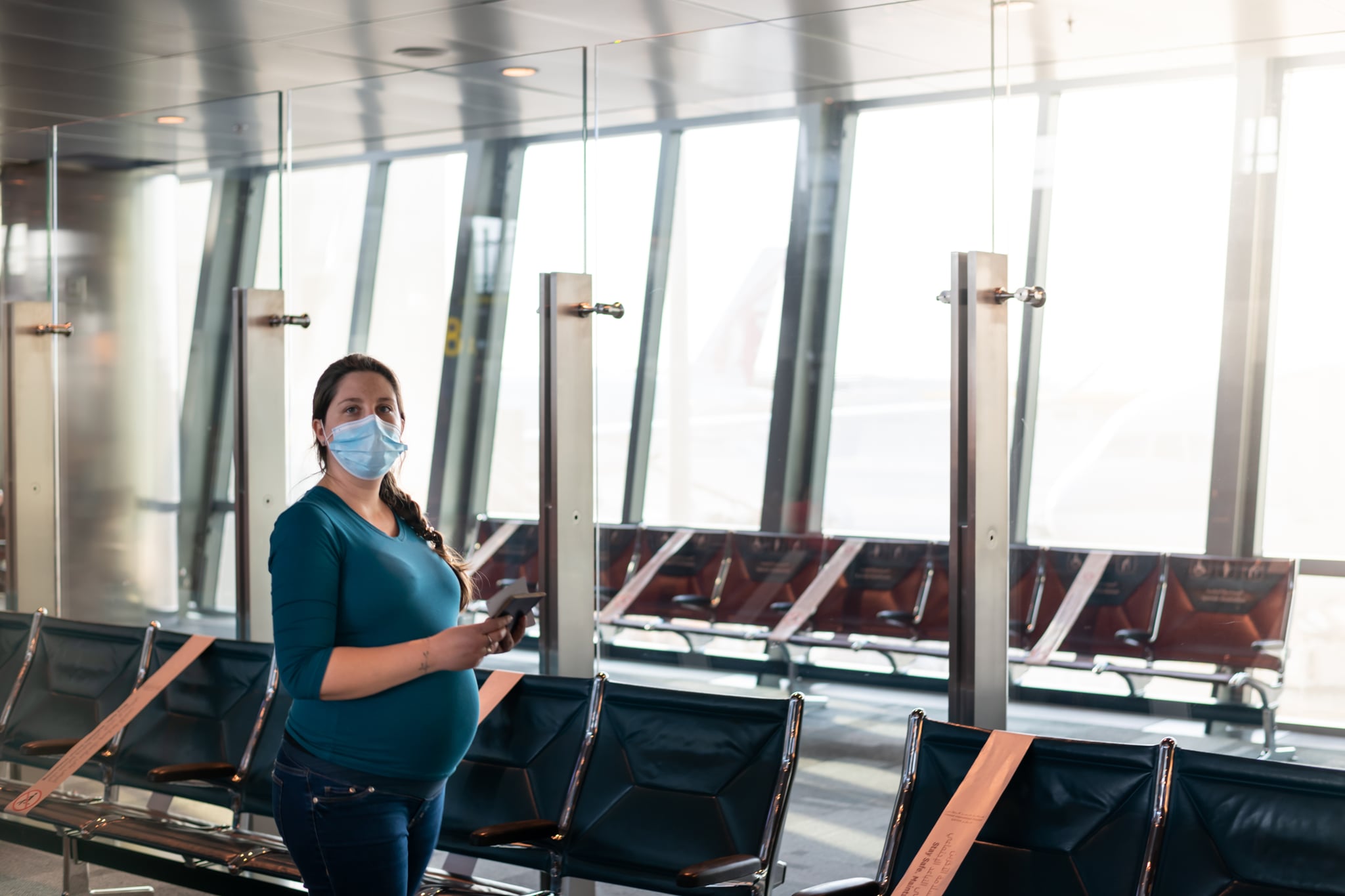
During pregnancy, there's a lot to think about: what to eat [1], finding the right doctors and making a birth plan [2], and preparing your home (and life!) for a new family member. But life doesn't stop just because of a pregnancy, and it seems unrealistic to avoid travel for nine months, especially if you're working, visiting family, or you just need a vacation.
That's why it's so important to understand how to travel while pregnant, and even more specifically, if you can fly while pregnant. "People often think flying increases the risk of miscarriage, which has not been shown in studies and has no basis scientifically," says Lisa Becht [3], MD, FACOG, a board-certified reproductive endocrinologist at HRC Fertility. In most cases, it's perfectly fine to fly before the 36-week mark, per Mayo Clinic [4].
But there are some important factors to keep in mind, including duration of flight, potential risks, and how to make the flight as comfortable as possible.
Is It Safe to Fly While Pregnant?
Generally, yes. "It is safe to fly while pregnant," says Dr. Becht. While some people may be concerned about altitude and air pressure in the cabin, these factors "do not threaten a pregnancy," Dr. Becht adds.
Still, some airlines have their own protocols. "Most airlines don't want people flying beyond 36 weeks," says Wendy Goodall McDonald [5], MD, a Chicago-based ob-gyn practicing at Women's Health Consulting. "I will often caution travel beyond 32 weeks, even for my low-risk patients. This is because pregnancy complications can arise more often as a person gets closer to term."
Both doctors recommend speaking with your ob-gyn before booking a trip to discuss your options, the length of the flight, and how far along you are — especially if your pregnancy is considered high risk, you have other medical conditions, you have been diagnosed with preeclampsia, or you are in the third trimester.
What Are the Risks of Flying While Pregnant?
Preterm labor or sudden complication is a consideration, especially given the lack of adequate equipment and care on a flight, says Dr. Becht. "Pregnancy complications like bleeding or preterm contractions are not able to be fully managed in the air, and access to appropriate care would be delayed. Therefore, women at higher risk of delivering or complications should avoid flying, especially longer flights."
Additionally, the extended period of inactivity — meaning sitting on a flight in a confined space — can also carry risk. "For prolonged sitting trips, we also worry about pulmonary embolism caused by blood clots that can develop in the legs. Pregnancy already increases the risk of developing blood clots. Prolonged sitting can also increase that risk," says Dr. Goodall McDonald. Compression socks and regular walking are two measures to prevent blood clotting on a flight.
Finally, expectant parents should weigh the risk of COVID carefully. In a confined space, especially one where mask wearing is optional, there's an increased risk of catching COVID and other illnesses, adds Dr. Becht.
Traveling When Pregnant by Trimester
Dr. Goodall McDonald stresses that there is no one definitive guide to flying during pregnancy. This type of decision requires an individualized discussion with a doctor and should touch on personal medical and pregnancy history, the location of the placenta, and the details of the flight.
However, as an overview, Dr. Becht adds some general guidelines below:
First Trimester. There are no formal restrictions on air travel during this period, though Dr. Becht says parents should consider "motion sickness, fatigue, and other symptoms that may make their flight more difficult."
Second Trimester. Again, there are no formal restrictions, but parents should consult with their doctors. If someone has been diagnosed with a short cervix, preterm contractions, high blood pressure, placental issues, or other complications, they should likely avoid flying, says Dr. Becht. And if you are flying during your second trimester, Dr. Becht recommends staying hydrated and picking a seat closer to the restrooms for frequent urination. (Aisle seats in particular make it easier to get in and out!)
Third Trimester. In addition to the same concerns as second-trimester flying, Dr. Becht says at some point in the third trimester, you will no longer be fit to fly. "Additionally, with a larger belly, it will likely be a less comfortable flight than usual, so consider getting more legroom and being on an aisle seat," she adds.
How Late in Pregnancy Can You Fly?
While the exact time frame for safe travel depends on an individual's pregnancy and health factors, there are generalized guidelines to keep in mind. "In the US, domestic travel stops by 36 weeks (or earlier, depending on your pregnancy). International travel often would stop earlier at 28 to 36 weeks depending on how far the location is from home, the time of the flight, and access to maternal and neonatal care in that country," says Dr. Becht.
How to Reduce the Risk of Flying When Pregnant
The best way to fly safely is to fly prepared. Staying hydrated, packing some snacks, wearing an N95 mask throughout the flight and airport visit, and bringing along antinausea meds is advised, says Dr. Becht. "In addition, be sure to walk around every two hours and wear compression stockings to reduce the risk of blood clots." Finally, stay in touch with your healthcare provider before booking travel, says Dr. Goodall McDonald.